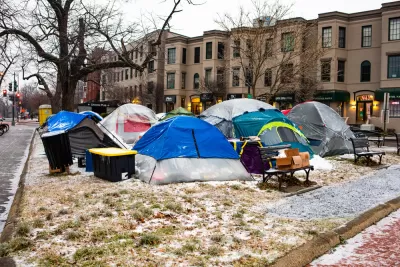The Washington Post’s editorial board calls for immediate and urgent action to reform the District’s housing policies as the region’s affordability crisis mounts.

An op-ed from the Washington Post editorial board argues for urgent action to reform Washington, D.C.’s housing authority and provide more badly needed housing in the region.
The board outlines the findings of a 72-page Department of Housing and Urban Development (HUD) report that highlights the agency’s failures, including 82 “managerial deficiencies.” The list includes “everything from leaving tenants’ personal information unprotected to noncompliance with HUD pet policies to numerous procurement breakdowns to a failure to ‘properly calculate rent’ to being ‘unable to provide documentation of the number of persons on its Public Housing waiting list,’ which hasn’t been updated in 10 years.”
As the op-ed states, thanks to the region’s affordability crisis, reforming DCHA management “cannot proceed at the city’s leisure.” With media home prices hitting $650,000 and the region seeing a shortage of roughly 320,000 housing units by 2030, the editorial board calls for immediate action.
What kind of action, one might ask? “Everything! Housing subsidies, requirements for affordable units in new developments, promotion of employer-sponsored housing projects — they’re all critical to closing the gap between what the workforce earns and what developers collect.”
Pointing to efforts in Arlington and Montgomery counties, which other entities in the region are eyeing cautiously as examples for housing policy reform, the board concludes, “No pain, no gain. Much-needed housing supply won’t build itself.”
FULL STORY: The D.C. region needs more housing. The time to act is now.

Planetizen Federal Action Tracker
A weekly monitor of how Trump’s orders and actions are impacting planners and planning in America.

Restaurant Patios Were a Pandemic Win — Why Were They so Hard to Keep?
Social distancing requirements and changes in travel patterns prompted cities to pilot new uses for street and sidewalk space. Then it got complicated.

Map: Where Senate Republicans Want to Sell Your Public Lands
For public land advocates, the Senate Republicans’ proposal to sell millions of acres of public land in the West is “the biggest fight of their careers.”

Maui's Vacation Rental Debate Turns Ugly
Verbal attacks, misinformation campaigns and fistfights plague a high-stakes debate to convert thousands of vacation rentals into long-term housing.

San Francisco Suspends Traffic Calming Amidst Record Deaths
Citing “a challenging fiscal landscape,” the city will cease the program on the heels of 42 traffic deaths, including 24 pedestrians.

California Homeless Arrests, Citations Spike After Ruling
An investigation reveals that anti-homeless actions increased up to 500% after Grants Pass v. Johnson — even in cities claiming no policy change.
Urban Design for Planners 1: Software Tools
This six-course series explores essential urban design concepts using open source software and equips planners with the tools they need to participate fully in the urban design process.
Planning for Universal Design
Learn the tools for implementing Universal Design in planning regulations.
Heyer Gruel & Associates PA
JM Goldson LLC
Custer County Colorado
City of Camden Redevelopment Agency
City of Astoria
Transportation Research & Education Center (TREC) at Portland State University
Camden Redevelopment Agency
City of Claremont
Municipality of Princeton (NJ)





























